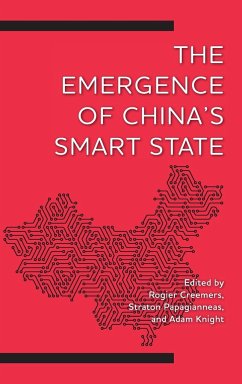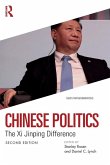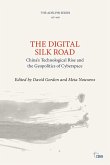Emergence of China's Smart State
Herausgeber: Creemers, Rogier; Knight, Adam; Papagianneas, Straton
Emergence of China's Smart State
Herausgeber: Creemers, Rogier; Knight, Adam; Papagianneas, Straton
- Gebundenes Buch
- Merkliste
- Auf die Merkliste
- Bewerten Bewerten
- Teilen
- Produkt teilen
- Produkterinnerung
- Produkterinnerung
This volume covers Chinese technology policy, key emerging technologies, international engagement, and central-local relations.
Andere Kunden interessierten sich auch für
![Guardrails Guardrails]() Urs GasserGuardrails25,99 €
Urs GasserGuardrails25,99 €![Innovation and China's Global Emergence Innovation and China's Global Emergence]() Erik BaarkInnovation and China's Global Emergence44,99 €
Erik BaarkInnovation and China's Global Emergence44,99 €![Chinese Politics Chinese Politics]() Chinese Politics39,99 €
Chinese Politics39,99 €![The Digital Silk Road The Digital Silk Road]() The Digital Silk Road36,99 €
The Digital Silk Road36,99 €![Cyberspace and the State Cyberspace and the State]() David J. BetzCyberspace and the State27,99 €
David J. BetzCyberspace and the State27,99 €![Preparing for Hybrid Threats to Security Preparing for Hybrid Threats to Security]() Preparing for Hybrid Threats to Security43,99 €
Preparing for Hybrid Threats to Security43,99 €![Strategic Intelligence Management Strategic Intelligence Management]() Strategic Intelligence Management56,99 €
Strategic Intelligence Management56,99 €-
-
-
This volume covers Chinese technology policy, key emerging technologies, international engagement, and central-local relations.
Produktdetails
- Produktdetails
- Digital Technologies and Global Politics
- Verlag: Rowman & Littlefield
- Seitenzahl: 262
- Erscheinungstermin: 16. Oktober 2023
- Englisch
- Abmessung: 235mm x 157mm x 20mm
- Gewicht: 552g
- ISBN-13: 9781538184417
- ISBN-10: 1538184419
- Artikelnr.: 68400548
- Herstellerkennzeichnung
- Libri GmbH
- Europaallee 1
- 36244 Bad Hersfeld
- gpsr@libri.de
- Digital Technologies and Global Politics
- Verlag: Rowman & Littlefield
- Seitenzahl: 262
- Erscheinungstermin: 16. Oktober 2023
- Englisch
- Abmessung: 235mm x 157mm x 20mm
- Gewicht: 552g
- ISBN-13: 9781538184417
- ISBN-10: 1538184419
- Artikelnr.: 68400548
- Herstellerkennzeichnung
- Libri GmbH
- Europaallee 1
- 36244 Bad Hersfeld
- gpsr@libri.de
Rogier Creemers is a lecturer in modern Chinese studies at Leiden University. His research focuses on Chinese domestic digital technology policy, as well as China's growing importance in global digital affairs. He is the principal investigator of the NWO Vidi Project "The Smart State: Big Data, Artificial Intelligence and the Law in China". For the Leiden Asia Centre, he directs a project on China and global cybersecurity, funded by the Dutch Ministry of Foreign Affairs. He is also a co-founder of DigiChina, a joint initiative with Stanford University and New America. Straton Papagianneas is a PhD candidate at Leiden University for Area Studies (LIAS). His PhD project will evaluate the role of smart systems in the post-4th Plenum legal reform agenda. This agenda intends to enhance the professionalization of courts and law enforcement bodies, strengthen courts' autonomy from local governments, broaden access to justice, and give priority to formal litigation. Adam Knight is a PhD candidate at the Leiden Institute for Area Studies (LIAS) where he focuses on the design, implementation, and consequences of the Chinese social credit system. He is a regular media commentator as well as speaker on the topic of smart governance and internet policy in China.
Introduction by Rogier Creemers
Part I: Digital Concepts and Institutions
Chapter 1: The Cyberspace Administration of China: A Portrait by Jamie
Horsley and Rogier Creemers
Chapter 2: The Stumbling Smart State: Fragmented Policy Experimentation &
Dubious Consolidation by Straton Papagianneas & Adam Knight
Part II: Strategic Emerging Technologies
Chapter 3: China's Industrial Policy for Semiconductors by John Lee
Chapter 4: Fintech in China: Trading off Growth and Risk, Innovation and
Control by Martin Chorzempa
Part III: International Engagement and Confrontation
Chapter 5: China: A Technical Standardisation Power? by Tim Rühlig
Chapter 6: China and Global Data Transfers: Implications for Future
Rulemaking by Hunter Dorwart
Chapter 7: China and Global Internet Governance: ITU, ICANN and the World
Internet Conference by Gianluigi Negro
Chapter 8: Becoming a Cyber Superpower: China Builds Offensive Capability
with Military, Government and Private Sector Forces by Mei Danowski
Part IV: Local Dynamics
Part I: Digital Concepts and Institutions
Chapter 1: The Cyberspace Administration of China: A Portrait by Jamie
Horsley and Rogier Creemers
Chapter 2: The Stumbling Smart State: Fragmented Policy Experimentation &
Dubious Consolidation by Straton Papagianneas & Adam Knight
Part II: Strategic Emerging Technologies
Chapter 3: China's Industrial Policy for Semiconductors by John Lee
Chapter 4: Fintech in China: Trading off Growth and Risk, Innovation and
Control by Martin Chorzempa
Part III: International Engagement and Confrontation
Chapter 5: China: A Technical Standardisation Power? by Tim Rühlig
Chapter 6: China and Global Data Transfers: Implications for Future
Rulemaking by Hunter Dorwart
Chapter 7: China and Global Internet Governance: ITU, ICANN and the World
Internet Conference by Gianluigi Negro
Chapter 8: Becoming a Cyber Superpower: China Builds Offensive Capability
with Military, Government and Private Sector Forces by Mei Danowski
Part IV: Local Dynamics
Introduction by Rogier Creemers
Part I: Digital Concepts and Institutions
Chapter 1: The Cyberspace Administration of China: A Portrait by Jamie
Horsley and Rogier Creemers
Chapter 2: The Stumbling Smart State: Fragmented Policy Experimentation &
Dubious Consolidation by Straton Papagianneas & Adam Knight
Part II: Strategic Emerging Technologies
Chapter 3: China's Industrial Policy for Semiconductors by John Lee
Chapter 4: Fintech in China: Trading off Growth and Risk, Innovation and
Control by Martin Chorzempa
Part III: International Engagement and Confrontation
Chapter 5: China: A Technical Standardisation Power? by Tim Rühlig
Chapter 6: China and Global Data Transfers: Implications for Future
Rulemaking by Hunter Dorwart
Chapter 7: China and Global Internet Governance: ITU, ICANN and the World
Internet Conference by Gianluigi Negro
Chapter 8: Becoming a Cyber Superpower: China Builds Offensive Capability
with Military, Government and Private Sector Forces by Mei Danowski
Part IV: Local Dynamics
Part I: Digital Concepts and Institutions
Chapter 1: The Cyberspace Administration of China: A Portrait by Jamie
Horsley and Rogier Creemers
Chapter 2: The Stumbling Smart State: Fragmented Policy Experimentation &
Dubious Consolidation by Straton Papagianneas & Adam Knight
Part II: Strategic Emerging Technologies
Chapter 3: China's Industrial Policy for Semiconductors by John Lee
Chapter 4: Fintech in China: Trading off Growth and Risk, Innovation and
Control by Martin Chorzempa
Part III: International Engagement and Confrontation
Chapter 5: China: A Technical Standardisation Power? by Tim Rühlig
Chapter 6: China and Global Data Transfers: Implications for Future
Rulemaking by Hunter Dorwart
Chapter 7: China and Global Internet Governance: ITU, ICANN and the World
Internet Conference by Gianluigi Negro
Chapter 8: Becoming a Cyber Superpower: China Builds Offensive Capability
with Military, Government and Private Sector Forces by Mei Danowski
Part IV: Local Dynamics









